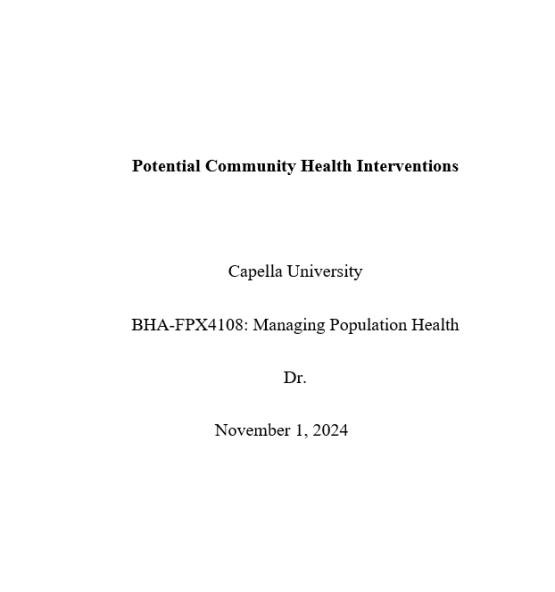
Potential Community Health Interventions
Capella University
BHA-FPX4108: Managing Population Health
Dr.
November 1, 2024
Availability:In Stock
Evidence-based solutions help address individual and population health needs. Stakeholders learn to utilize treatment and prevention models that match health issues across a community. A health issue that requires a renewed commitment to designing and implementing viable solutions is diabetes. The problem associated with rising blood glucose levels reinforces the need for self-management practices to prevent symptoms from escalating to severe levels. Patients can choose their preferred approach for controlling and managing diabetes symptoms. One intervention is intensive insulin therapy which entails a commitment to restore normal insulin secretion. Using intravenous insulin enables individuals to meet target blood glucose levels with regular testing and adjustment of doses to overcome the risk of undesirable progression. Similarly, self-care management is a viable option for patients to take charge of their health and well-being. The intervention encourages patients to adopt healthy eating, risk-reduction behaviors such as smoking cessation, and physical activities necessary to maintain healthy blood glucose levels. This paper discusses the social determinants of health in the Bronx and the implications of intensive insulin therapy and self-care on patients’ health and well-being.
The Bronx is among the places with a high number of fast-food restaurants. One is likely to find a place to eat because there is always a restaurant or at least a fast food place they can order from within the community. The situation exposes residents to being overweight and having diabetes. Notably, diabetes in the Bronx is escalating considering one in three people suffer from diabetes. The region is among the places with the highest rates of diabetes (Thorpe et al., 2018). The most affected populations are low-income and minority groups. The populations have challenges such as limited access to adequate and quality healthcare, which expose them to negative health-seeking behaviors. Hispanics and Blacks are the most affected due to constrained access to screening, diagnosis, prevention, and treatment services (Thorpe et al., 2018). The low-income groups are likely to purchase unhealthy foods since it is more costly to afford vegetables and fruits than it is to buy fast food. This situation makes diabetes a common disease and a leading cause of death among adults.
Social determinants of health help identify vulnerable and under-resourced households. The determinants such as income and education help stakeholders to assess the implications of health disparities on diabetes burden across the community. Accurate and adequate data on risks such as physical inactivity, unhealthy diet, and poor blood glucose level monitoring provides insights into the determinants of health and appropriate solutions (Rural Health Information Hub, 2022). The data guides policymakers, healthcare providers, and other stakeholders to design tailored approaches, including culturally and linguistically appropriate services to enhance diabetes self-management awareness. For instance, there are opportunities to organize educational sessions in community meetings to make residents aware of risks, symptoms, and effective diabetes management practices.
The audience benefits from accessible advice provided by qualified diabetes educators and other professionals. Thus, social determinants of health make more people aware of the situation in the community and the opportunity available to improve their quality of life. Social determinants of health influence individuals’ ability to manage diabetes and prevent severe and costly complications. Stakeholders such as the public health department also enhance surveillance, understand community needs, and initiate evidence-based plans for improving individual and population health.
Evidence-Based Treatment Model
Diabetes is a chronic condition that jeopardizes one’s health and productivity. The leading causes of uncontrolled diabetes or new cases are poverty, low education levels, limited access to care, and challenges accessing healthy food. Uncontrolled symptoms increase the cost of care, hence the need for patient-centered and evidence-based care to safeguard individuals from the adverse impacts of the seventh leading cause of death in the United States (Wadden et al., 2019). Timely response reduces the risk of heart disease, kidney failure, and toe amputations. Intensive insulin therapy is a viable option for individuals living with diabetes. The method is appropriate for controlling glucose levels and reducing the risk of severe complications in the long term (Wadden et al., 2019). The right commitment and good level of understanding of the condition and symptoms enable individuals to benefit from regular shots of insulin and frequent testing.
Reviews
There are no reviews yet.